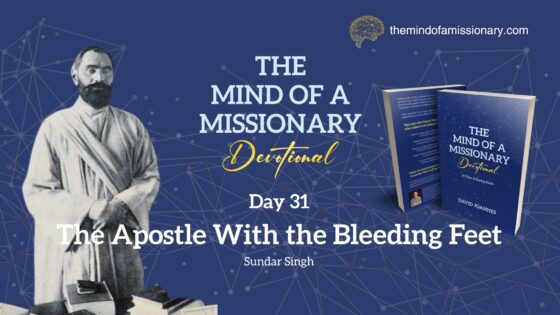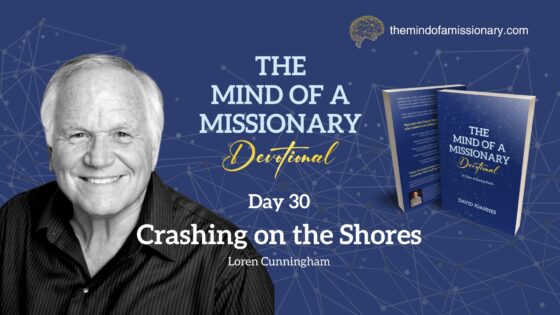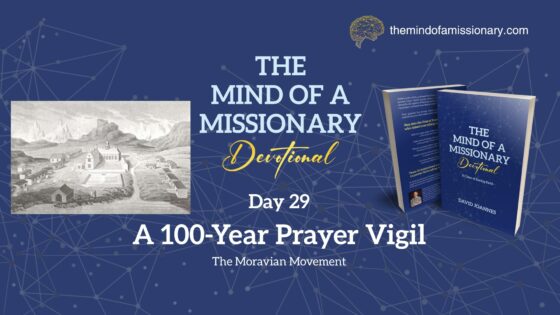Day 23
The Mind of a Missionary Devotional
Bound by Love
Johann Leonhard Dober and David Nitschmann
“And He said to all, ‘If anyone would come after Me, let him deny himself and take up his cross daily and follow Me.’” — Luke 9:23
Ocean blue and the sapphire sky met on the line of the distant horizon as the ship was ready to set sail from Copenhagen. On October 8, 1732, two pioneers embarked on a mission that would change the course of Christian history.
As the vessel left the dock, the missionaries stood on its deck, their eyes fixed on the receding shoreline. Linking arms, they shouted back to their loved ones, a cry that would become the anthem of future Moravian missions: “May the Lamb that was slain receive the reward of His suffering!” The reward Jesus had claims upon, the two missionaries believed, was people from every corner of the planet giving Him the worship He deserved.
The two young Moravian missionaries, Johann Leonhard Dober and David Nitschmann, prepared for a sacrificial voyage across the seas. Their hearts were burdened for the enslaved races in the West Indies, having heard of their plight and the spiritual darkness that enveloped them. The stories of slavery and suffering were heart-wrenching, but what moved these young men even more was the realization that these souls had never heard the name of Jesus.
In 1731, Anthony Ulrich, an enslaved man who came from Saint Thomas to Copenhagen with his master, painted a bleak picture of his people’s lives. Their toils were relentless, leaving no room for rest or spiritual instruction. Bursting with emotion, Anthony cried, “Oh, that someone would go preach the Gospel to my sister in Saint Thomas!” The only conceivable way to reach his people, he believed, was for someone to become a slave alongside them. It was a radical notion, nearly impossible and incredibly dangerous. Yet, for Dober and Nitschmann, the call of Christ was louder than the voices of doubt or fear. They were willing to sell themselves into slavery if that was the only way to bring the light of the Gospel to these oppressed souls.
As Dober and Nitschmann stepped ashore in the West Indies, they opened a new chapter of Christian ministry among the enslaved people, reshaping the direction of Christianity in the process. Their journey met with severe challenges and hardship. The unfamiliar terrain of the West Indies, the cultural barriers, and the ever-present shadow of persecution were constant reminders of the cost of their calling. Yet, they pressed on, fueled by a passion for God’s glory and a love for the lost.
The Moravian Brethren labored in the West Indies for fifty years. Their efforts bore fruit. Before any other missionary group set foot on the islands, the Moravians had baptized over 13,000 converts. Their dedication laid the foundation for Christian work among enslaved people, and their legacy would inspire countless others to take up the mantle of missions.
The ripple Dober and Nitschmann cast from eighteenth-century Europe created the early stirrings of a missionary work that would be felt worldwide. The Moravians were the first large-scale Protestant missionary movement. They were the first to send lay ministers as missionaries, the first Protestant denomination to reach enslaved people, and the first Christian presence in many countries. At the height of the movement, one in every twelve Moravians was serving overseas. They played a part in John Wesley’s salvation and were one of the most significant influences in William Carey’s life—the man now known as the “Father of Modern Missions.”
Dober and Nitschmann’s willingness to sell themselves into slavery for the sake of suffering souls was a living testament to Christ’s sacrifice and the boundless love of God. As they ventured into the unknown, the words of Matthew 28:19-20 echoed in their hearts: “Go therefore and make disciples of all nations.”
Though their names have largely been forgotten in present-day Christianity, their impact remains. Their lives echoed the Moravian movement’s founder, Nikolaus Ludwig von Zinzendorf, who encouraged missionary recruits to “preach the Gospel, die, and be forgotten.” Giving their lives for the Gospel was a risky undertaking then and even more unimaginable today. However, Dober and Nitschmann’s willingness to sacrifice everything, even their freedom, inspired scores of others to follow in their footsteps. They spread the glorious Gospel message, compelling Christians to take up their own crosses and follow Jesus.
– Personal Response –
Passage: And He said to all, “If anyone would come after Me, let him deny himself and take up his cross daily and follow Me.” (Luke 9:23)
Point: True love for Jesus means radical obedience, despite the risks or costs involved.
Ponder: What are you unwilling to surrender for the sake of the Gospel? Is there anything that you are elevating above Jesus?
Prayer: Lord, give me the courage to follow You wherever You lead. Let my love and faithful dedication be so fervent that no sacrifice feels too great. In Jesus’ name, amen.
Proclamation: I will deny myself, take up my cross, and follow Jesus with boldness wherever He sends me.
Practice: Take one step today to serve someone who feels forgotten, whether at home, in your community, or across the world. Let love move you to radical action.
Learn more about The Mind of a Missionary Devotional at themindofamissionary.com




